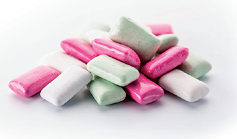People have been chewing gum for thousands of years. Now chewing gum has become an action more than habit. If you take a good look at any sidewalk or classroom desk, flattened pieces of gum or chunks of it stuck everywhere. You can go to any convenience store, grocery store, or even just a novelty store, and find gum for sale. Gum is everywhere.
Being so popular, one may think that gum is almost a necessity in this society. But here comes the question: Is chewing gum bad?
Is Chewing Gum Bad for You?
 The answer is yes. Chewing gum is bad for you. The artificial sugars in gums can decay teeth and add more unwanted calories. Chewing gum can also cause headaches and jaw pain. People with Irritable Bowel Syndrome can be affected by ingredients in gums which may cause more bloating and discomfort in their tender large intestines. Some specific reasons are given as below:
The answer is yes. Chewing gum is bad for you. The artificial sugars in gums can decay teeth and add more unwanted calories. Chewing gum can also cause headaches and jaw pain. People with Irritable Bowel Syndrome can be affected by ingredients in gums which may cause more bloating and discomfort in their tender large intestines. Some specific reasons are given as below:
1. Chewing Gum May Have a Bad Influence on Your Diet
A stick of gum can be pretty handy when you feel hungry. Research shows that while gum does indeed reduce food cravings, meals eaten by gum chewers tend to eat foods with less nutrition than their gum-free counterparts.
For example, gum chewers do not often eat fruit and vegetables. Instead they go for junk food like French fries and candy, most likely because of the clash between the taste of minty gum and everything else.
2. It May Cause Temporomandibular Joint Disorder
If you favor one side over the other while chewing gum, you might develop a jaw muscle imbalance or even TMJ. It can be painful and sometimes chronic. When a set of muscles are overused, they may contract and cause headaches, toothaches, and earaches.
3. It May Lead to Gastrointestinal Problems
Is chewing gum bad for your gastrointestinal system? Yes, continuously swallowing excess air can cause IBS (Irritable Bowel Syndrome), and therefore cause symptoms such as belly pain and bloating. Additionally, chewing gum makes your body get ready for digesting food. This can actually compromise your ability to make enough stomach acid and enzymes to digest real food. Sometimes you may even have other symptoms such as diarrhea. This is because of the artificial ingredients in all kinds of gum.
4. It May Do Harm to Your Tooth
 Is chewing gum bad for your teeth? Yes, chewing gum can cause your teeth to become coated in sugar, which will help to speed up tooth decay. Sugar-free gum also has acidic ingredients and preservatives that may cause dental erosion. This means that over time your teeth will be dissolved. This can happen even if your gum has cavity-fighting components.
Is chewing gum bad for your teeth? Yes, chewing gum can cause your teeth to become coated in sugar, which will help to speed up tooth decay. Sugar-free gum also has acidic ingredients and preservatives that may cause dental erosion. This means that over time your teeth will be dissolved. This can happen even if your gum has cavity-fighting components.
5. Mercury from Your Teeth Fillings May Vapor
You may have fillings in your teeth that contain mercury. Chewing gum can actually make the mercury neurotoxin to activate and release into your bloodstream.
The mercury in your bloodstream causes oxidative reactions in your body’s tissues. For those with mercury fillings, this can be especially problematic.
6. Chewing Gum May Make Teens Have a Headache
Is chewing gum bad for your child? Yes, during a study involving 30 regular teens who often chewed gum between the ages of 6 and 19, researchers found that they all suffered from tension headaches or chronic migraine. After one month of not chewing any gum, 19 chewers’ headaches had disappeared completely while 7 of them had a major decrease in frequency and severity. Twenty-six children resumed their gum chewing only to find that their headaches returned within days.
7. Artificial Sweeteners in Gums May Damage Your Health
Artificial sweeteners are ever-present in gum, even in sugar-free ones. One common chewing gum sweetener is aspartame. This ingredient will be turned into wood alcohol which is a kind of poison, and formaldehyde by your body.
Considering that the walls of your mouth can absorb many potentially harmful ingredients into your body directly, this isn’t really something you want. These artificial sweeteners have been linked to weight gain, cancers, birth defects, and brain tumors.
